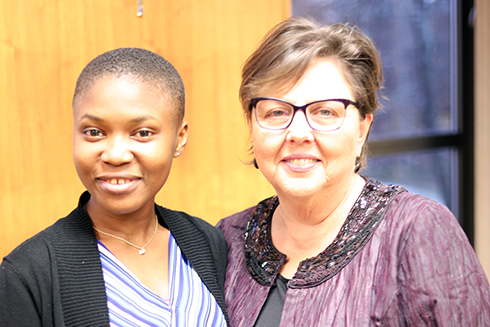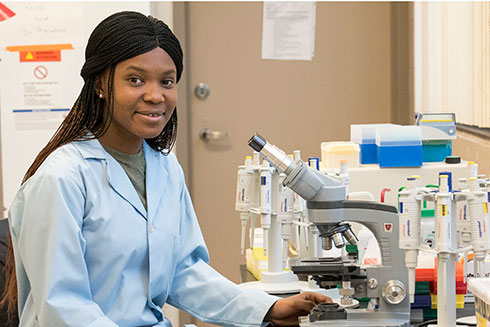Pre-med student wins national AIDS Scholarship
Jariatu Stallone awarded Pedro Zamora Young Leaders Scholarship from the National AIDS Memorial

When the National AIDS Memorial first phoned to tell her that she had won the scholarship, Jariatu Stallone rejected the call thinking it was a scam.
The second-year biology pre-med student had spent months searching online for scholarships. “It’s an African thing for parents to pay for your kids’ education,” said Stallone, who moved to Manassas, Virginia, from Sierra Leone in June of 2015. “Getting a scholarship would really help my dad because he’s worked so hard here,” she said.
While on the hunt for assistance, a friend and Pitt-Bradford Resident Advisor Adam C. Williams sent Stallone a link to the Pedro Zamora Young Leaders Scholarship from the National AIDS Memorial — and something clicked. “I was like, ‘Wow, I know what I could do with this,’” Stallone said.
Named in honor of AIDS educator, activist and reality television pioneer Pedro Zamora, who died 25 years ago from an AIDS-related illness, the scholarship awards 10 undergraduate students a total of $50,000 each academic year. The goal is to financially support young leaders who carry the torch of activists like Zamora, mitigating the impact of the HIV/AIDS epidemic in ways inspired by their own passions, insights, originality and conviction, according to the organization’s website.
It was the perfect opportunity for Stallone. Before coming to the U.S., she led a team of volunteers partnering with the World Health Organization in rural areas of Sierra Leone. She created workshops that discussed the roles of stigma, discrimination and disparate treatment as barriers to effective HIV/AIDS prevention and care. The volunteers traveled around the country to speak with families and schools about sexually transmitted diseases.
All this amid the 2014-2016 Ebola outbreak in West Africa, where Sierra Leone had the highest number of confirmed cases and the second highest death toll of any country, according to the Centers for Disease Control and Prevention. When Sierra Leone declared a state of emergency in 2015, Stallone, along with 1.8 million children, missed a year of formal learning due to school closures.
I immediately knew she was exceptional.Dr. Mary Mulcahy, Stallone's academic adviser
Still, she continued her work on HIV prevention as it became all the more important: Ebola’s devastating effect on the health care workforce of Guinea, Liberia and Sierra Leone caused setbacks in the treatment and control of other diseases like HIV.
“Even more than here, sex is a taboo topic” in Sierra Leone, she said. “HIV and AIDS, it’s something that they don’t really talk about back home.” In addition, tribal laws, religious practices and ethnic and cultural norms make it difficult to raise awareness, she said.
“It was a really tough process because it all boiled down to what kind of family background you’re coming from. A lot of them are very highly religious. We really try to create this dialogue. We really try to understand when they’re trying to vent their frustrations. We also try to talk to them about our ideas and what we think.”
Stallone described this civil discourse in her application for the Zamora Scholarship.
“We chose Jariatu because of the strength of her essay and personal statement,” said Annie Wilson, a previous Pedro Zamora Young Leaders Scholarship recipient who now co-chairs the scholarship committee.
“Jariatu spoke a lot about persisting when she received a lot of pushback from members of her community who didn’t quite understand what she was trying to do. We were also impressed by her experience creating workshops and working to distribute contraception to students in her community, and informing her community about how HIV is transmitted to avoid new contractions.”

In the end, Stallone was encouraged by the outcomes of her work. More often than not, she said, parents would say, “Oh, I didn’t understand that, I didn’t know that.” It validated her efforts to educate.
“I immediately knew she was exceptional,” said Mary Mulcahy, associate professor and director of the biology program at Pitt-Bradford. Mulcahy taught Stallone’s Introductory Biology lecture and lab courses, but they met during orientation two years ago.
“She jumped right into the campus community,” Mulcahy said, citing Stallone’s work as vice president of the pre-med club, joining the ROTC and becoming a building manager for Frame-Westerberg Commons on the Bradford campus.
As Stallone’s academic advisor, Mulcahy discussed the need to get some clinical experience. “The next thing I knew, it was summer and without any help from me, she had figured out how to become a Certified Nurse Assistant and to begin paid work as a CNA.”
Most recently, Stallone decided she’ll go for Army Basic Training this summer. She’s looking forward to pursuing research in HIV prevention and care or other areas in future summers.
The Pedro Zamora Young Leaders scholarship is meaningful to Stallone because she feels like she “did something great” for her dad, but it has also helped her gain a different perspective.
“The money helps for the financial constraints, but at the same time, it’s given me a clearer idea about, it’s not just about school, I can also be doing something else while still being in school. I feel like it has helped me see myself as a different person at this point.” She’s learned this in part, she said, from seeing what other students are doing with their scholarships, and being a part of this cohort.
“This whole thing has really opened my eyes to kind of see a different picture about life in general.”
Media Contact: Micaela Fox Corn mfc19@pitt.edu 412-624-4065 | 617-997-2289